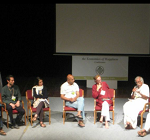What might an “economics of happiness” look like? This question brought together hundreds of people for a conference in Bangalore on March 15. In an auditorium packed with opponents of a corporate-dominated globalisation, numerous speakers outlined a vision of a new economic system anchored in community, localisation and fairness.
“Our aim is to overcome the fragmentation between activism and spirituality, between the environmental movement and those fighting for social justice” Manish Jain, a co-host of the conference, said. Jain is the coordinator of Shikshantar: The People’s Institute for Rethinking Education and Development, which is based in Udaipur.
At its heart, the call for an economics of happiness is a longing to rebuild face-to-face bazaar spaces which thrive on an inter-dependence of the human economy and nature’s ecosystem – rather than pitting them in a fatal conflict. In other words, localisation is the fulcrum of this emergent economics. This does not mean an isolating parochialism, but a new way of thinking about economic systems.
How can the alternatives be built? On this, there is a diversity of views, underpinned by a broad consensus on what is wrong with the model of globalisation that has spread across the world over the last 25 years.
A statement published by the Eternal Bhoomi journal, another co-host of the conference, outlines this model of globalisation: it has led to vast disparities, with less than 1% of the world’s people now owning more than 41% of the globe’s wealth; beneath the velvet glove of development is the iron hand of uni-polar power, exerted by the U.S. through the World Bank, the IMF and the WTO; it has entailed a suicidal increase in carbon emissions, a rapid destruction of eco-systems and forests, monopolisation of agriculture, food and health systems, and destruction of community structures.
Several speakers alluded to the West-based Occupy Wall Street movement at the conference and agreed with the idea made popular by the movement: 99% of the world’s population is being taken for a ride by the 1% which has acquired disproportionate wealth.
“Globalisation is rooted in the idea of endless growth in a finite environment. This is not possible” Gloria Germani, a representative of the Happy Degrowth Movement in Italy, said. In Italy, she said, more and more people see globalisation as a failure because of the high rate of unemployment.
“There is an urgent need for both decentralisation and localisation of power,” Helena Norberg-Hodge, founder of the International Society for Ecology and Culture and another co-host of the conference, said. Norberg-Hodge pointed out that in India, localisation is not a new idea – Mahatma Gandhi worked extensively on the need for human-scale and sustainable economic systems.
While the critique is sharp, the answers being sought have a spiritual foundation. “Localisation is compassion, without which nature cannot last,” Samdhong Rinpoche, the former prime minister of the Tibetan government in exile, said at the conference. For 200 years after the industrial revolution, he said, “…there has been a shift towards more and more human greed. Now the challenge is: how to come out of this? There is hope in the longing for survival, this may enable us to change mindsets.” The needs of the future, he said, are “non-violence, sustainability, eco-friendliness and reaching the poorest of the poor.”
How is this to be made possible? After all, as Mahinarangi Maika, an activist from New Zealand said, “The biggest challenge is liberating people’s minds so they can even imagine that localisation is possible.”
But perhaps the biggest challenge will be in explaining and illustrating that the new economics seeks “intelligent growth.” Stephan Harding, a British ecologist, has written that intelligent growth implies that many good things must grow, quickly: material, social as well as spiritual.
What, then, is the future of an “economics of happiness”? The term will evoke a lot of initial interest, but its advocates are bound to have a tough time, because they are challenging the idea of perpetual material progress and an ever-rising GDP – an idea widely accepted as the basis for determining the success or backwardness of a country.
Much of the hope can come from the wide variety of highly-trained young people who are walking away from jobs in the mainstream market. Instead, they are turning to creative new organisations that foster both business models and social structures that are community-based and grounded in compassion. They are driven by a passion to foster a needs-based rather than a wants-based economy, which will function in accordance with the laws of nature rather than be at war with nature.
This article is the first part of a two-part series.
Rajni Bakshi is the Gandhi Peace Fellow at Gateway House: Indian Council on Global Relations.
This blog was exclusively written for Gateway House: Indian Council on Global Relations. You can read more exclusive content here.
For interview requests with the author, or for permission to republish, please contact outreach@gatewayhouse.in.
© Copyright 2011 Gateway House: Indian Council on Global Relations. All rights reserved. Any unauthorized copying or reproduction is strictly prohibited


